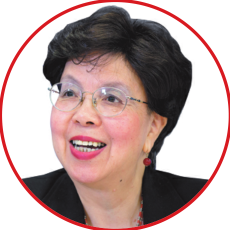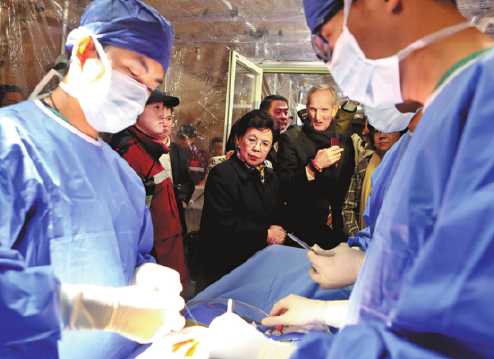
Aug 21, 1947, in Hong Kong
EDUCATION:
1973: Bachelor of Arts, home economics, Brescia University College
1978: Doctor of Medicine, University of Western Ontario
1985: Master of Science, public health, National University of Singapore
CAREER:
1978-89: Medical officer, Hong Kong Department of Health
1989-92: Assistant director, Hong Kong Department of Health
1992-93: Deputy director, Hong Kong Department of Health
1994-2002: Director, Hong Kong Department of Health
2003-05:Director, department for protection of the human environment, World Health Organization
2005-06: Assistant director-general for communicable diseases, WHO
2007-17: Director-general, WHO
2018-present:Member of the National Committee of the Chinese People's Political Consultative Conference
Focus on health the right prescription

The village doctors, known as "barefoot doctors" because many farmers worked barefoot in the rice paddies, promoted basic hygiene, preventive healthcare and family planning, and treated common illnesses in rural areas.
That inspired Mahler, and in 1978, at a WHO conference in what is now Kazakhstan, he proposed calling on local communities to help decide healthcare priorities, an emphasis on primary and preventive healthcare, and seeking to link medicine with trade, economics and other political and social areas.
"In 1978, the Chinese barefoot doctor approach for training locals in basic healthcare inspired the primary healthcare movement launched by the Declaration of Alma-Ata, which became the brand name for much of the WHO's work," Chan said.
Since adopting its reform and opening-up policy in 1978, China has made tremendous achievements in the medical and healthcare sector, improving the health of one-fifth of the world's population.
"It is no longer the 'sick man of East Asia'," Chan said. "China was later gradually developed into a healthy country and 'a role model for developing countries', which is recognized by the WHO."
She said the most remarkable development has been the wide coverage of medical insurance.
China embarked on the biggest health system reform the world has ever seen in 2009, aiming to extend medical services beyond the country's prosperous urban centers.
At the start of the century, less than a third of China's population had access to health insurance. Now nearly 100 percent do. A basic medical services network, covering both urban and rural areas, has been put in place, with 980,000 medical and health institutions at all levels, 11 million health workers, and 7 million beds at medical institutions.
Praising China for giving its huge population a safety net that protects people from being impoverished by the costs of healthcare, Chan said it was a tremendous contribution to a fair and prosperous society.
The average life expectancy in China rose from 35 years in the 1940s to 76.5 years in 2016. The country is aiming for 77.3 by 2020 and 79 by 2030, according to its Healthy China 2030 blueprint released in 2016.
"These main health indicators of the Chinese are generally better than the average level of middle- and high-income countries, and China has achieved the UN's Millennium Goals in this regard ahead of schedule," Chan said.
The results are also gains from the pain of an epidemic outbreak 15 years ago, she said.
In 2003, severe acute respiratory syndrome, or SARS, spread worldwide after first appearing in southern China's Guangdong province. It was carried to Hong Kong by an infected doctor, sparking a global outbreak that struck down more than 8,000 people and left more than 800 dead in 32 countries.


